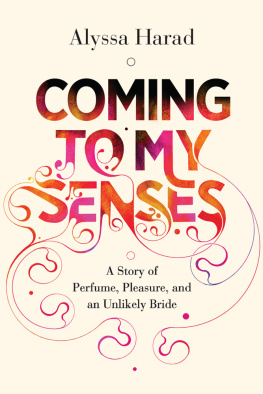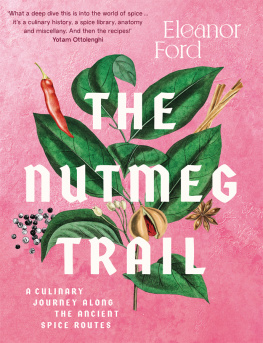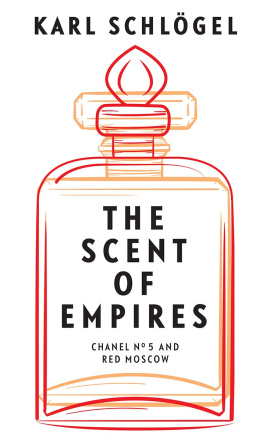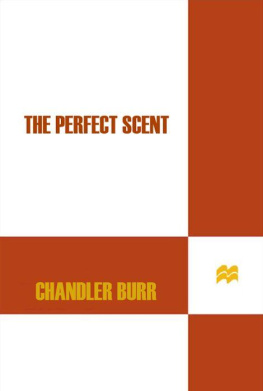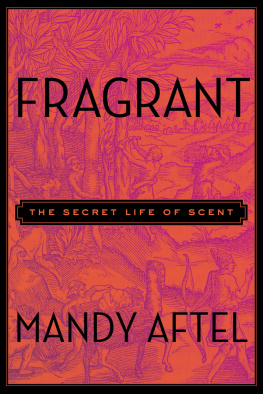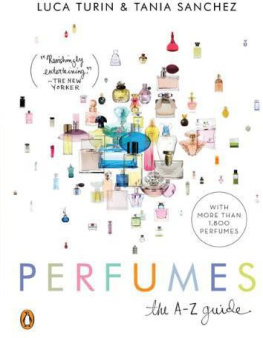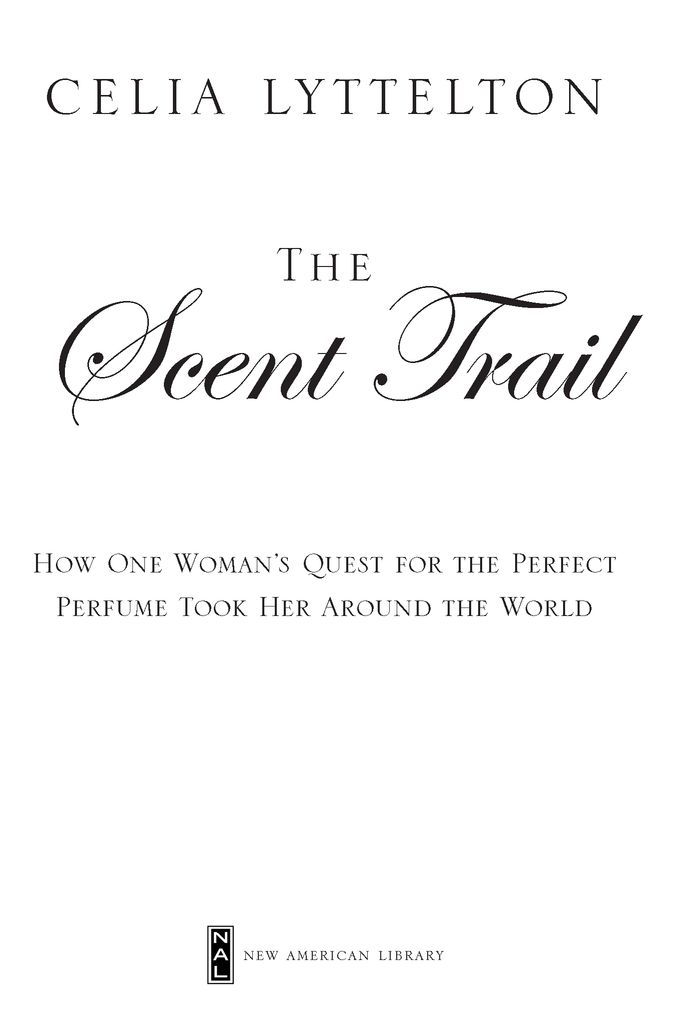Table of Contents
Praise forThe Scent Trail
A magical journey of the senses.Yorkshire Evening Post
The Scent Trail is dense with fascinating facts, stories, literary references, and history.The Times Literary Supplement
When Celia Lyttelton set out to have a scent created solely for her, she found herself propelled into an adventure that would take her across the world, investigating the origins, history, and culture of wonderfully exotic ingredients.... The Scent Trail tells her story.Woman and Home Magazine
A fantastic book about perfume and our sense of smell.
Times Online
The intriguing relationship between scent, memory, and place is the underlying note in Lytteltons journey through the history, creation, and business of perfume. We are whisked to traditional perfumers workshops, with their vial-filled antique cases, to the spice souks of Marrakech, Ottoman houses in Turkey adorned with necklaces of peppers and chilies, iris farms in Italy, and the mossy-floored cedar forests of Azrou.The Australian
Have you ever had that overwhelming surge of emotion when even a faint smell transports you back to another place and time? This is exactly the type of feeling Celia Lyttelton sets off to explain as she embarks on a journey of discovery.... This book offers an insight into the foreign origins of the perfumes lining chemist shelves, while taking us on a sensory adventure around the globe.RealTravel
Artist and journalist Celia Lyttelton has traveled the world to discover the people behind perfume, from the peasants to the noses. Yorkshire Today
A travel memoir and vividly drawn portrait of todays exotic world of perfume.Bookcase
The importance of the scent trade between countries and culture throughout history is revealed in The Scent Traila beautiful travel memoir that awakens the olfactory senses along with the imagination and longing for faraway places.Travelbeat
In memory of my mother, Margaret Lyttelton
Acknowledgements
MY AGENT, CLARE CONVILLE OF CONVILLE AND WALSH, my editor, Angela Mackworth Young, and my editor at Transworld, Brenda Kimber, for their patience and tact in guiding me through several drafts of this book. My father, Adrian Lyttelton, who read through the book, giving many helpful suggestions. Stephen for driving me all the way from London to the Sahara and back, and Tarquin for map reading toddler style. Barry Flanagan for his advice and generosity. Brida McAlinden for looking after her grandson, Tarquin, during my many road trips abroad.
For the following chapters, I would like to thank:
One: Anastasia Brozler, who guided me (and my nose) to compose a formula scent.
Two: Roberto Henrichson, for putting up with us, and putting us up in Paris; Christof Kicherer, for giving me introductions to perfumers in Grasse; Pamela Roberts of LArtisan Parfumeur; and to my brother Francis Lyttelton and Dee Grayling Montgomery, who had us to stay on the island of Ibiza, while we regrouped for our trip on to Morocco.
Three: Ccile and Cyril Commargue, my interpreters and companions for when I met Serge Lutens and Dr. Belkamil; Professor Martin, an ethnobotanist who guided me around the medina and its myriad plants, spices and scents in Marrakech.
Four: M. Roca of Robertet, who gave me an introduction to their Turkish Rose Factory; and to M. Allard and Mr. Timour for their hospitality at the Rose factory itself.
Five: Nicola Howard for introducing me to Valeria Rosselli of the Iris Garden in Florence; and to Matthew and Maro Spender and Charlotte Horton for their hospitality and Chianti-fueled suppers of roast porcupine.
Six: Mrs. Helga Perrera Blow for her kind hospitality at her hotel, the Folly in Kandy, and to Julian West for having me to stay at the Old Stone House and introducing me to the movers and shakers of nutmeg.
Seven: The late Jeremy Fry and his son Francis for having me to stay up in the Palani mountains, and to Francis, for being a hilarious traveling companion on some of my trips around India and Sri Lanka, and for being a superb dancing partner at the Madras Taj Disco.
Eight: I am indebted to Douglas Botting, who gave me so much encouragement and advice about Socotra, assuring me that there were no Al Qaeda cells on the island; Barnaby Rogerson, who introduced me to Botting and also gave me advice for Chapter 2; and Tim Mackintosh Smith for his advice and scholarly tips, characteristically laced with jokes.
Nine: I am grateful to my driver, Mohammed, and my interpreter, Jamil, and to the noble tribes of Socotra for their hospitality. Thanks too to Anthony Milnroy of the Socotra Conservation Fund for his advice.
Introduction
SCENT HAS GREAT POWER. ITS DEVELOPMENT CHARTS THE spread of civilizations, the beginnings of science and medicine, the movement of faiths and the links between the ancient, classical, medieval and modern worlds.between
And because scent evokes memoriesat one time or another we have all experienced those sudden unexpected moments when a trace of scent instantly reminds us of an incident from childhood, or a forgotten landscape, or the presence of a long-lost loverwe tirelessly search for the right one. The personal associations that are bound up with scents are wonderfully vivid for every one of us; there are certain scents and certain smells that lead to instant recall, often with hallucinatory clarity.
According to Proust, each hour of our lives is stored away in a smell and in a taste, and when those smells or tastes are reexperienced memories are triggered. The more prosaic reason that the connection between smell and memory is so strong is that the olfactory nerves transport information to the brains limbic system and to its cortex. The limbic system is the primitive part of the brain where our memories are formed, our emotions and moods are regulated and our sense of smell is lodged. The cortex is the complex part of the brain that has to do with conscious thought.
The sense of smell also has the power to suppress the rational, critical left brain and to stimulate the creative, dreamy right brain, so it evokes memories with more emotional force than any other sense. I am convinced that we wear scent not just to make us feel more attractive, but because it unlocks the emotions associated with memories that come flooding back when we smell the scent of the lipstick our mother wore or the fragrance of the woodsmoke from the fire in the cottage where we spent an idyllic weekend.
Sight and sound are physical senses, but smell and taste are chemical: when you breathe in the smell of a pine forest, or your mothers skin, you are taking molecules right inside your body, and that makes smell a very intimate sense. Kipling wrote, Scents are surer than sounds or sights to make your heartstrings crack.
From birth to death our eyesight and other senses deteriorate, but our sense of smell never weakens because the cells regenerate every twenty-four days. We dont use this sense enough; the nose is capable of recognizing some 500,000 different odors, and although, consciously, the brain might not register them all, once youve smelled something for the first time, the next time you encounter that particular smell you can immediately identify it.


